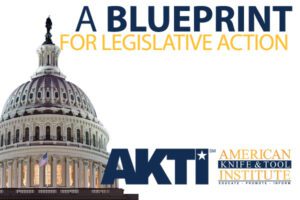 In the 1950s and 1960s, based on the misconception that criminals often relied on automatic knives, numerous states passed legislation restricting the sale or possession of switchblade knives. In recent years, many states that had previously restricted these knives have revisited their antiquated laws. Notably, twenty-four states have repealed or revised laws surrounding the sale and possession of automatic knives. Today, forty-five states allow manufacturers and retailers to sell automatic knives. In these states, law-abiding citizens also enjoy owning and possessing these commonplace knives without fear of committing a criminal act.
In the 1950s and 1960s, based on the misconception that criminals often relied on automatic knives, numerous states passed legislation restricting the sale or possession of switchblade knives. In recent years, many states that had previously restricted these knives have revisited their antiquated laws. Notably, twenty-four states have repealed or revised laws surrounding the sale and possession of automatic knives. Today, forty-five states allow manufacturers and retailers to sell automatic knives. In these states, law-abiding citizens also enjoy owning and possessing these commonplace knives without fear of committing a criminal act.
This change – a success story for our industry – is due to concerted efforts that continue in the remaining five states. Future success will depend on our ability to: (1) focus on the right messages, those that resonate with broad political philosophies; (2) partner with local and national key opinion leaders and companies to help supplement our efforts; and (3) find effective champions in each state to sponsor legislation and help us enact new laws.
One example is Ohio, which enacted this type of legislation in April 2021. Our advocacy efforts in the Buckeye State span not only multiple legislative cycles but multiple legislative sponsors and gubernatorial administrations as well, with a pivotal moment occurring when our message changed, resulting in broader political support.
Early efforts in Ohio tied the right to possess a knife to the 2nd Amendment. While this may be factually accurate, the affiliation to a controversial issue immediately pinned supporters and opponents alike to their respective corners and made policymakers (many of whom avoid engaging in the subject) queasy about taking this on or supporting our issue. More specifically, the opposition had nothing to do with knives, and it made it nearly impossible to explain the policy issue at hand.
AKTI focused on the message that a knife is a tool and the fact that using knives has become a daily action for individuals from tradespeople to outdoor recreationalists to first responders and law enforcement. This simple yet important change was the precursor to two critical endorsements: the Ohio Legislature’s Sportsmen’s Caucus and the AFL-CIO. Additionally, we worked with the Ohio Department of Agriculture to anticipate and respond to concerns from the DeWine Administration. The snowball effect, which took years, led to a Senate passage of the bill by a vote of 32-1 and the bill ultimately being signed into law by Governor DeWine.
Prior efforts in Pennsylvania to enact similar legislation failed to gain momentum. Using a similar blueprint, AKTI led efforts to make significant progress in a single year. Working closely with W.R. Case & Sons Cutlery, AKTI worked with Representative Causer, House Republican Policy Committee Chair, to introduce legislation. Using similar messaging points as in Ohio, we brought together other stakeholders into the process, including, but not limited to:
- Local and national groups and companies such as the Pennsylvania Federation of Sportsmen & Conservationists, Great Eastern Cutlery (Titusville), Guardian Tactical (Emporium), Peter’s Heat Treating (Meadville), and W.R. Case & Sons Cutlery (Bradford)
- The United Union of Roofers, Waterproofers & Allied Workers sent letters from the national association, as well as local 30 (Philadelphia) and 37 (Pittsburgh).
Our lobbying efforts focused on both driving up support for the legislation and driving down concerns. As one policymaker noted, the result was a recognition that the bill was “an economic development bill, not a public safety bill.” More importantly, much like Ohio, the bill passed unanimously out of Committee and with just one dissenting vote in the House of Representatives – an incredible turnaround from years previous when similar legislation never even made it out of Committee. The bill passed the Senate unanimously and was signed by the Governor. Success!
In many cases, bills have passed with bipartisan support, and knife ban repeals have been signed into law by both Republican and Democratic governors. Whether in the states where prohibitions remain or advocating for policy initiatives important to our industry and our way of life, AKTI’s ability to discuss them in ways that attract the broadest support possible has an overwhelming impact. Advocacy can make for strange bedfellows, but it also leads to success.